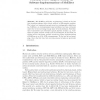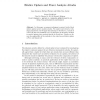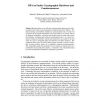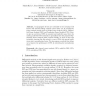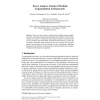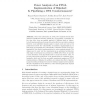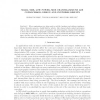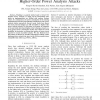135
click to vote
PQCRYPTO
2010
15 years 15 days ago
2010
The McEliece public-key cryptosystem is based on the fact that decoding unknown linear binary codes is an NP-complete problem. The interest on implementing post-quantum cryptograph...
127
click to vote
EIT
2008
IEEE
15 years 3 months ago
2008
IEEE
Abstract--In the decade since the concept was publicly introduced, power analysis attacks on cryptographic systems have become an increasingly studied topic in the computer securit...
121
click to vote
FSE
2000
Springer
15 years 5 months ago
2000
Springer
In this paper, we present techniques to protect bitslice block ciphers against power analysis attacks. We analyze and extend a technique proposed in [14]. We apply the technique to...
104
click to vote
FPL
2006
Springer
15 years 5 months ago
2006
Springer
This paper presents FPGA implementations of the DES and Triple-DES with improved security against power analysis attacks. The proposed designs use Boolean masking, a previously in...
115
click to vote
FDTC
2006
Springer
15 years 5 months ago
2006
Springer
Abstract. Balanced gates are an effective countermeasure against power analysis attacks only if they can be guaranteed to maintain their power balance. Traditional testing and reli...
CHES
2006
Springer
15 years 5 months ago
2006
Springer
Cryptographic devices are vulnerable to the nowadays well known side channel leakage analysis. Secret data can be revealed by power analysis attacks such as Simple Power Analysis (...
122
click to vote
CHES
1999
Springer
15 years 6 months ago
1999
Springer
Abstract. Three new types of power analysis attacks against smartcard implementations of modular exponentiation algorithms are described. The first attack requires an adversary to ...
108
click to vote
CHES
2004
Springer
15 years 7 months ago
2004
Springer
Since their publication in 1998, power analysis attacks have attracted significant attention within the cryptographic community. So far, they have been successfully applied to di�...
142
click to vote
AES
2004
Springer
15 years 7 months ago
2004
Springer
Abstract. When cryptosystems are being used in real life, hardware and software implementations themselves present a fruitful field for attacks. Side channel attacks exploit infor...
103
click to vote
ITCC
2005
IEEE
15 years 7 months ago
2005
IEEE
Abstract— Masking is a general method used to thwart Differential Power Analysis, in which all the intermediate data inside an implementation are XORed with random Boolean values...
